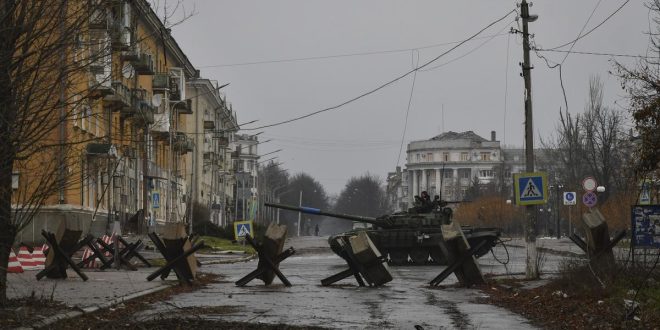AT
Kabul: Ukraine’s capital came under one of the biggest attacks of the war on Friday as Russia’s forces fired dozens of missiles across the country, triggering widespread power outages, Ukrainian officials said.
Gunfire from air defense systems and thudding explosions combined with the wail of air raid sirens as the barrage targeted critical infrastructure in Kyiv, Kharkiv, Kryvyi Rih and Zaporhizhzhia. The head of the country’s armed forces said Ukrainian forces intercepted 60 of the 76 missiles launched.
Russian strikes on electricity and water systems have occurred intermittently since mid-October, increasing the suffering of the population as winter approaches. But the Ukrainian military has reported shooting down incoming rockets and explosive drones.
Friday’s attack took place after the United States this week agreed to give a Patriot missile battery to Ukraine to further boost the country’s defense. Russia’s Foreign Ministry warned Thursday that the sophisticated system and any crews accompanying it would be a legitimate target for the Russian military.
More than half of the Russian missiles fired Friday targeted Ukraine’s capital. The city administration said Kyiv had withstood “one of the biggest rocket attacks” it has faced since Russia invaded Ukraine nearly 10 months ago.
Ukraine’s air force said Russian forces had fired cruise missiles from the Admiral Makarov frigate in the Black Sea, while Kh-22 cruise missiles were fired from long-range Tu-22M3 bombers over the Sea of Azov, and tactical aircraft fired guided missiles.
Electricity and water services were interrupted in parts of the country, including in the capital and Ukraine’s second-largest city, Kharkiv. Thousands of people sought shelter in subway stations deep underground during the bombardment.
State-owned grid operator Ukrenergo wrote on Facebook that emergency shutdowns were triggered across the country. Priority in restoring power will be given to critical infrastructure facilities, including hospitals, water supply facilities, heat supply facilities, and sewage treatment plants, it said.
Friday’s attack was “the ninth wave of missile strikes on energy facilities,” Ukrenergo said, and because of the repeated damage, “the restoration of power supply may take longer than before.”
Russian strikes targeting energy infrastructure were part of a new strategy to try to freeze Ukrainians into submission as Moscow tries to buy time for a possible offensive in coming months after the current battlefield stalemate.
The southeastern city of Zaporizhzhia and its surrounding region were hit by 21 rockets, city council secretary Anatoly Kurtev said. Lights went out in some areas, but there were no initial reports of injuries, he wrote on Telegram.
Kharkiv Mayor Ihor Terekhov said on Telegram that the city was without electricity. Kharkiv regional governor Oleh Syniehubov reported three strikes on the city’s critical infrastructure. Kyiv Mayor Vitali Klitschko reported explosions in at least four districts and urged residents to go to shelters.
“The attack on the capital continues,” he wrote on the social media app. Subway services in the capital were suspended, he said, as city residents flocked inside its tunnels to seek shelter.
In neighboring Moldova, the state-owned energy company Moldelectrica reported disruptions to its electricity network as a result of Russia’s strikes on Ukraine, and warned of a “high risk” of power outages.
Moldova — whose Soviet-era systems remain interconnected with Ukraine’s — has already suffered two massive blackouts in recent months as Russia attacked Ukraine’s energy grid.
 Afghanistan Times
Afghanistan Times




